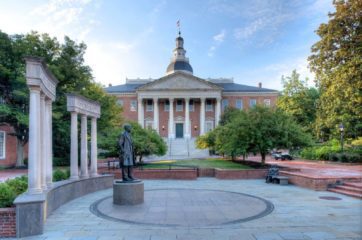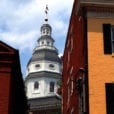Over the past month I’ve had the pleasure of working with and getting to know the newest member of the Climate XChange team, Wandra Ashley-Williams. A dedicated climate and justice activist, Wandra has years of demonstrated success as an elected official, corporate executive, and community advocate. Now, she will leverage these accomplishments to focus on addressing the climate crisis in her home-state of Maryland.
The Mid-Atlantic region presents a unique political opportunity to advance bold and equitable policies that meaningfully tackle the climate crisis. As our Maryland Regional Director, Wandra is focused on bringing the best practices that Climate XChange has developed in the areas of advocacy, research, and media to assist the region in achieving successful climate policy.
I recently had a chance to sit down with her to discuss (among other things) her personal journey and her desire to solve the climate crisis facing her community. The following is a transcript of our conversation.
What is your story? Tell us a bit about how you came into this work?
I have always been an advocate for social justice and a voice for the voiceless. As an elected official, I directed my efforts to influence public opinions and public policies to create a more just society. As a corporate executive, I helped to develop policies and procedures that were fair and transparent and promoted a working environment that was supportive and inclusive of all people regardless of gender, race, and age. As a community activist, I am led by a vision of human and civil rights. Joining with local organizations and coalitions, to help create a more socially just society. I advocate for a thorough justice education for all our children; quality and affordable healthcare and prescription drugs for all citizens; public safety and a criminal justice system that is fair and equitable; the right to vote for all citizens without fear or intimidation; and the elimination of homelessness.
I was always conscious of the climate crisis we are experiencing in America and worldwide. I recycle religiously. I don’t use plastic straws and bags or Styrofoam containers. While I understood how this climate crisis affects our socially and/or economically disadvantaged communities, I didn’t fully appreciate the nexus in terms of the direct impact of environmental injustices. That is, not until I was appointed to serve on the Environment and Climate Justice Committee (ECJ) by the Chairman of the Board of the National Association for the Advancement of Colored People (NAACP). That was one of my first appointments as a member of the NAACP National Board of Directors, and thus began my environment and climate justice advocacy.
Is there anything in particular that made you decide to shift your focus more towards climate change?
Since serving on the ECJ Committee, I have developed a better sense of why the NAACP sees the climate crisis as a civil rights issue. I have attended many convenings and trainings related to environmental issues and climate change. I’ve personally seen the increase in the severity of storms and hurricanes over the years, storms like Sandy and Isaac, which devastated communities down the eastern coast. We have watched our sisters and brothers in Louisiana, Biloxi, the Bahamas, Puerto Rico and even the Eastern Shores of Maryland lose their homes to rising sea levels. And, we are witnessing longer periods of drought in some regions and more frequent wildfires, most recently, the devastation of the fires in California.
The climate crisis is real. The proliferation of climate change has a disproportionate impact on communities of color and low-income communities in the United States and around the world. I want to do whatever is in my power to save our planet for future generations. So, as I advocate for social justice, it is essential that my advocacy includes protecting our planet.
What do you most look forward to doing while at Climate XChange?
We know that carbon pollution, greenhouse gas emissions play a major role in the climate crisis. I look forward to bringing an equity lens to the conversation as Climate XChange addresses ways to reduce carbon emissions in Maryland and nationwide. As we move to a low carbon economy it is important we have a just transition where those most affected are not just considered, but are actually at the table when decisions are made that affect their communities. I believe, if you are not at the table you could very well be on the menu.
What is the biggest challenge facing climate action in Maryland at the moment?
I would say the biggest challenge facing Maryland in this space is educating legislators and the public on the climate crisis. What is this crisis? How did we get here? What is climate change, carbon emissions, fossil fuels, greenhouse gases, a just transition, a green economy, etc.? What is it going to take to resolve this crisis? While there is increasing conversation around climate change these days, most people don’t have a clear understanding of why we are in an emergency situation.
Most policy changes will happen through legislation. The challenge is going to be getting legislators to the table. Making climate change as important of a priority as education funding, criminal justice issues, health care initiatives, voting rights, homelessness, jobs for the formerly incarcerated –– bread and butter concerns legislators, their families, and their constituents are talking about and worried about. How do we impress on them that the climate crisis is just as important as all these issues? I think an important first step is showing them that the climate crisis affects many of the same issues they are concerned about.
In your experience, what is the number one way people can make a substantial difference in policy advocacy?
Get involved. Join coalitions –– we are more powerful in numbers. But remember, being invited to sit at the table doesn’t always mean you get to eat. Your voice needs to be heard, your position needs to be clearly articulated, and you need to be seen in this space.
What makes you hopeful for the future?
I am encouraged that there is a serious conversation about the climate crisis among the presidential candidates. I am hopeful that America will elect a president and a Congress in 2020 that is serious about addressing this crisis at the federal level.









